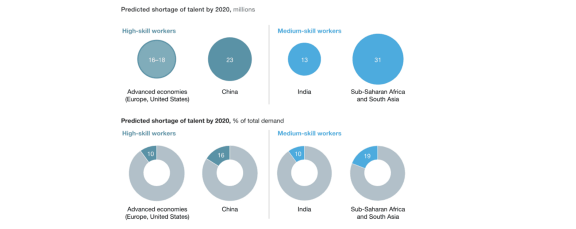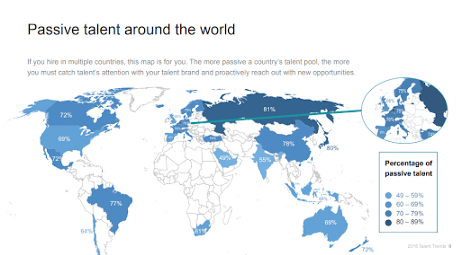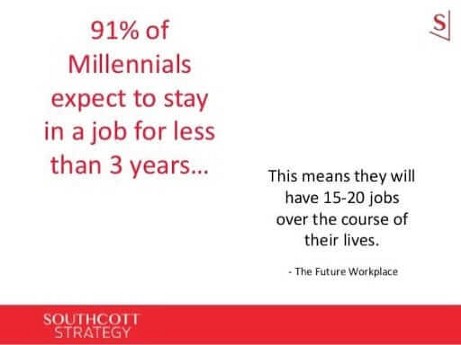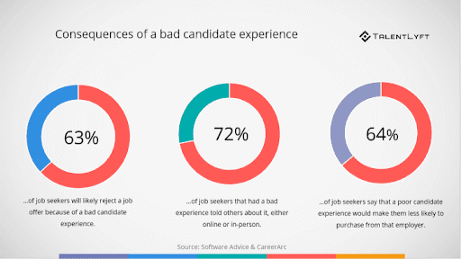The recruitment industry is not all honey-and-milk. There are many recruitment challenges that can wreak havoc and leave recruiters wondering where they went wrong.
The perfect day of a recruiter looks something like this: You walk into the office and your assistant gives you your morning coffee. You sit on your desk and check your email. Out of ten candidates you’ve contacted, eight wrote back, asking for further information. Even the most talented candidates want to see you for lunch. They say they love your company culture! What’s more, your hiring process is down to 12 days. Everything is so good that you think you’re dreaming.
You probably are! Although recruiters worldwide dream of days like these, in reality, things are much more challenging. From attracting talented individuals to retaining millennials, these are the most common recruiting challenges, supported by relevant statistics.
There’s Talent Shortage on a Global Level
The term “war for talent” refers to the fierce competition to attract employees. This “war” happens at a time when too few workers are available to replace the baby boomers who are departing the workforce in advanced economies.
Failure to attract and retain top talent was the #1 problem in the Conference Board’s 2016 survey of global CEOs. A McKinsey Global Institute study also reported that companies in Europe and North America will need 16 million to 18 million more educated employees in 2020 that are going to be available. More alarmingly, only 23% of managers and senior executives believe their current acquisition and retention strategies will work.
For this reason, the talent shortage gives a strong headache to recruiters worldwide. It’s one of the major recruitment constraints and challenges that recruiters face on a daily basis.
Tip: Make your job offer magnetic. In the job post, include tangible rewards, the benefits of working in your company, and explain how leadership helps employees. If your company culture is stronger than the competition’s, you will attract and retain the best talent.

Persuading Passive Candidates is Especially Difficult for Recruiters
Did you know that 70% of the global workforce are passive individuals who aren’t actively searching for a job? The more passive the talent pool is, the more recruiters must catch talent’s attention with their talent brand.
Passive candidates are more likely to reach out to their personal networks for job opportunities. They are open to talking to a recruiter and are somewhat satisfied at their current workplace. For this reason, recruiters must catch talent’s attention with their talent brand and proactively reach out with new opportunities.
Tip: Setting clear hiring priorities and encouraging your employees to share company opportunities with their personal networks will help you stand out as an organization and find the talent you need. Using InMail? Most people read their InMails on the go, so grab their attention by only including information they care about in your first InMail.

Recruiters are Struggling to Retain Millennials in the Workforce
The problems with millennials in the workplace are numerous. According to the Future Workplace survey of 1,189 employees and 150 managers, 91% of Millennials expect to stay in a job for less than three years. This means they would have 15 – 20 jobs over the course of their lives.
Millennials are less loyal to their companies than their parents before them. This is a significant recruitment challenge as the cost of turnover is substantial. When an employee leaves, a large amount of resources and time is spent on searching for new talent and onboarding. What’s more, when your employees go to work for the competition, they get an insider’s understanding of your strategies, operations, and culture.
Tip: Flexible hours and generous telework benefits are highly important to younger workers than is salary. Let them contribute creatively to the company and have their ideas heard. Above all, make sure to communicate your company’s values during the recruiting process.

A Good Candidate Experience is Another Recruitment Challenge
A good candidate experience is an amazing marketing strategy. A bad one may result in the right candidate turning down the job. Why? Because no one wants to be part of a company that doesn’t care about the recruiting process. For this reason, a good candidate experience is a major recruitment challenge.
If a candidate sits alone in a conference room for an hour because you overlapped a meeting, that candidate will tell people about it. Candidates know that the way you treat them during the hiring process is how you will treat them after hiring. It’s understandable why they might turn down your job offer if the candidate experience was poor and disorganized.
Tip: Knowing what candidates want throughout their job search journey can help you build an effective recruiting strategy. It’s important to know that the most effective talent branding tools are company websites (68%), online professional networks (i.e., LinkedIn), and social media (i.e., Facebook, Twitter). Nearly 89 % of talent says being contacted by their recruiter can make them accept a job offer faster. What’s more, talent is more likely to consider your company if you offer them constructive feedback.

Final Word
The road to hiring the right person is thorny. From problems with millennial’s in the workplace to a bad candidate experience, there are many recruitment challenges to overcome. Putting in the extra effort now can have a number of benefits as you begin hiring in the new year.
To sum up, the major recruiting challenges include:
- There’s a talent shortage on a global level. Recruiters must make their job offers magnetic.
- 70% of the global workforce are passive individuals who aren’t
actively job searching. Recruiters must encourage their employees to share company opportunities with their personal networks to help recruiters find the talent they need. - 91% of Millennials expect to stay in a job for less than three years. Recruiters must offer flexible hours, generous telework benefits, and many opportunities for growth and creativity.
- Poor candidate experience. Recruiters must gather candidate feedback so they can identify their biggest areas for improvement.
We hope that you find our list of recruitment challenges and solutions to be useful in the long-run.













